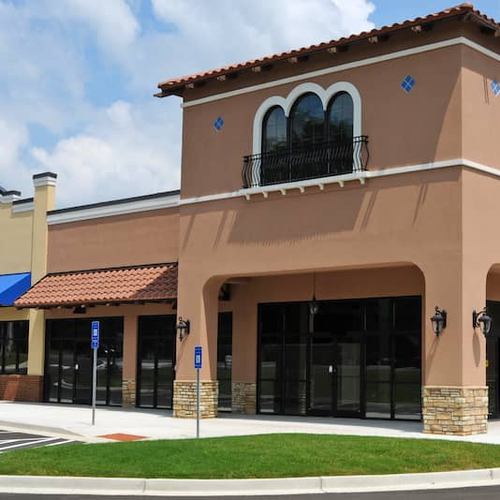Buying commercial property for beginners: How to start
Dec 27, 2024
•9-minute read

New investment opportunities pop up every day for bright entrepreneurs. From cryptocurrency to stock and bonds, it’s a wide world out there.
But what about sinking your teeth into a physical asset? For those who want to invest in something tangible with the potential for growth or passive income, you may want to consider buying commercial real estate. Here’s how you begin.
What is commercial real estate?
Commercial real estate (CRE) is used for business purposes, meaning the property is used to generate income. These types of commercial real estate investments are often office buildings, apartments and retail stores. The main purpose of commercial real estate is to create passive income for investors.
Types of commercial real estate
You can break commercial real estate into five main categories:
- Multifamily: Essentially, multifamily homes are residential properties with more than one unit, like duplexes, garden apartments or assisted living facilities. Note that multifamily homes might be considered residential real estate depending on local laws.
- Office space: They’re designated as low-, mid- or high-rise based on size, and they allow for multiple tenants. Examples include medical offices and suburban office buildings.
- Retail: This type of real estate is designated for businesses that sell goods or services to consumers. They’re usually located in places that are conveniently accessible, like regional malls and strip shopping centers.
- Industrial: These properties range in size – like office spaces – and they host industrial operations, such as heavy manufacturing or light assembly.
- Hospitality: This covers establishments that service travelers – whether for meals, accommodations or entertainment – like hotels and short-term rentals.
Commercial office properties face further classification and are broken into three class gradings:
- Class A: This represents the highest-quality buildings available. They’re typically newer with top-tier construction and are situated in the best location.
- Class B: These can still be high-quality properties, but they’re usually older and lower-priced compared to Class A. Many investors flip or restore these.
- Class C: These are generally distressed and older. Class C properties require maintenance and lack an attractive location.
Differences between commercial and residential properties
Although some properties that people reside in can be commercial properties, there things that make them different.
Tenant management
Tenants of most commercial properties have far more financial obligations than do those of residential properties. Commercial tenants can be asked to pay property taxes, some level of maintenance and insurance. Between these expenses and the fact that tenants often have their own business and profit dependent on the integrity of the space, commercial tenants will often take good care of their space.
Furthermore, in a residential building, one can expect tenant management to be necessary around the clock. However, in a commercial building, it’s more likely that the building will only be occupied during certain hours of the day. This can make property and tenant management a bit easier.
Lease structures
Leases for most kinds of commercial properties tend to be far more detailed and individualized than residential leases, which are more standardized according to law. Fewer legal regulations means that commercial leases can be negotiated between tenant and landlord, while such negotiations are rare in residential situations.
Pros and cons of investing in commercial real estate
Just as with any kind of investment, there are benefits and drawbacks to investing in commercial real estate.
Pros of commercial real estate investing
- The commercial real estate market is booming, with a significant anticipated growth over the next 5 years due to the demand for flexible workspaces.
- Certain kinds of commercial real estate are likely to have more consistent and long-term leases than residential real estate, which often has yearly leases. Low tenant turnover comes with lower risks than high turnover does.
- Rent is usually higher with commercial properties, and the landlord is often off the hook when it comes to property taxes, insurance and maintenance due to these being the tenant’s responsibility.
- Leases can be more flexible for some kinds of commercial real estate.
Cons of commercial real estate investing
- Being a landlord is not always as passive as “passive income” suggests. You will have to ensure everything is properly maintained, collect rent, offer viewings and so on. This can be alleviated by hiring a property manager.
- Any kind of real estate investment is going to have high initial costs. As many commercial real estate properties are large in size and might have multiple tenants, these can be even higher than they might be with smaller, residential properties.
- Unlike residential real estate, which will always be necessary, the need for different kinds of commercial real estate fluctuates over time. If you have a number of warehouses designed for a specific industry that leaves the area, you might struggle to find tenants and face expensive renovation costs to adapt to a new market.
How to get into commercial real estate
Figuring out how to buy commercial property isn’t exactly like buying a single-family home. The experiences differ in more ways than one. The costs, for example, can be steep with commercial real estate, and it may be harder to secure funding. In addition, if you don’t already have tenants, then it’s up to you to cover expenses when the properties are unoccupied.
Not only that, but valuation for commercial property is often difficult. It’s generally harder to find comparable properties for commercial real estate than residential. Comparables are properties that are similar in size, features and location to the one you’re looking to buy. Because comparables are harder to find, investors should be careful before purchasing commercial real estate.
If you think you’re ready to buy or invest in commercial real estate, there are a few steps you can take to prepare.
1. Define your motivation
While buying commercial real estate can be a worthwhile investment, plans tend to fall through if you don’t have direction. If you want to narrow down your motivation, consider asking yourself:
- What is a successful financial return to me?
- Who do I hope to impact through my investment?
- What are my long-term and short-term goals?
- Do I want security for me and/or my family?
Buying commercial property for personal use
Sometimes, investors purchase a property for personal use. One method is the owner-occupied commercial real estate (OOCRE) investment strategy. In this case, the owner uses the property to conduct business operations.
OOCRE affords you tax advantages, like the ability to depreciate and deduct annual interest on the loan. In addition, owning the property allows you to build equity, which means you can sell it for more later. Or you can continue using the property as an income stream through leasing. Managing the property on-site and controlling the tenant selection is much easier.
However, more costs may fall in your lap, such as property repairs and routine maintenance. Conflicts of interest can also arise, making it difficult to collect rent.
Before buying commercial property for personal use, check zoning laws. Certain limitations may apply to commercial real estate properties, like office buildings or other commercial-designated spaces.
Buying commercial property for investment purposes
Buying a commercial building as an investment property comes with its perks. Commercial property returns range between 9% and 12% annually; that’s higher than the average for single-family residential properties (which is typically around 10%). There are also tax advantages, cash flow opportunities and equity appreciation when you buy commercial property.
Investors employ a variety of tactics depending on their financial goals and the overall timeline. Here are some of the most common real estate investing strategies:
- Land banking: This is the process of purchasing and holding land. Investors do this to protect and grow their money, since it gets tied to a physical and fixed asset. They may sell the land or develop it in the future.
- Development: An investor buys raw land to build on. The direction of development, like condominiums versus commercial, depends on zoning laws.
- Fix and flip: This strategy involves buying property, renovating it and then reselling it for a profit. Investors usually purchase poorly maintained land at a discount.
- Wholesaling: This is a short-term real estate investing strategy where the wholesaler buys a contract from a property seller, typically below market value. Then, the wholesaler sells or assigns the contract to an interested buyer.
- BRRRR: This acronym stands for Buy, Rehab, Rent, Refinance, Repeat. Essentially, it’s a passive income strategy that involves flipping a property to rent out to tenants. Once the owner pays the mortgage and builds equity, they can refinance to fund future real estate investments.
- Passive investing: This strategy is for investors who don’t want to be directly involved. Instead, they put capital into a real estate deal through the stock market, crowdfunding or partnering with a more active investor.
2. Secure financing from a lender
Finding a lender for your commercial property early on is essential. But compare several lenders before you settle on one. While you want to secure financing, you should ensure you're getting what you need for your investment. Ask about possible fees and if there are any penalties for paying the loan off early.
Consider the loan-to-value (LTV) ratio, or how much the lender is willing to loan you, and whether they ask for collateral. It’s important to note that a recourse loan lets the lender go after additional personal assets if you default. Whereas a nonrecourse loan only gives them the option to seize agreement-specific collateral.
As you debate purchasing a commercial property, you may wonder about your lending options. Some of the most common are permanent loans – which are long-term loans granted after a property has been constructed – FHA loans, SBA loans, bridge loans and hard money loans. It’s important to note that Rocket Mortgage® doesn’t offer commercial property financing.
3. Hire a team of trusted professionals
Everyone has to start somewhere, but first-time investors shouldn’t begin alone. It’s better to have people with experience and knowledge on your side. That way, the process moves smoothly and efficiently, which will save money in the long run. Some professionals you may want to think about hiring include:
- REALTOR®: A commercial real estate REALTOR® usually goes through more training than a residential REALTOR® and needs specific degrees, like business or finance. They help with many responsibilities, such as researching potential properties or negotiating terms for their clients.
- Attorney: A professional real estate attorney saves you time closing on a deal, protects your interests during negotiations and helps you understand applicable laws. They can also get you better pricing and ensure the agreement is legitimate.
- Accountant: An accountant handles the financial side of things, preparing budgets, creating monthly reports and generating any necessary statements for tax purposes.
- Mortgage broker: A mortgage broker matches you with the best lender for your needs. They can submit multiple loan applications to increase your approval chances and track down better pricing.
- Contractor: These professional construction workers or companies oversee the site, materials and more during the course of the project. They may also come with a team of specialized interior designers.
- Property manager: This individual supervises the property and takes care of tenants. Property managers also facilitate or address repairs in the building. Other responsibilities include collecting rent, hiring contractors and meeting with potential clients.
4. Find the perfect opportunity
Numerous factors come into play for commercial real estate investors looking for the right property.
Some things you may want to think about while searching include:
- Economic and industry trends
- Affordable leasing options
- Zoning laws and land use
- The property’s design
- Potential for growth
- Market data – like rental rates, vacancy rates and construction costs
5. Run the numbers
Due diligence plays a crucial role in real estate investing.
Before the actual purchase, you’ll want to evaluate the location and the real estate market. You’ll also want to compare multiple properties and assess the condition of the property you decide on.
There are a few formulas and tools you can use to estimate a property’s value. Some are:
- Cost approach: This is how much it would take to rebuild from scratch.
- Market approach: This is how much the property is worth based on other similar, recently sold properties.
- Income capitalization approach: This is the estimated income you’ll receive from the property.
- Gross rent multiplier (GRM): This is the potential value based on the property’s price, divided by its gross income.
- Value per door: This is the value of a building, primarily apartments, according to the number of units.
6. Make an attractive offer
After calculating potential costs and profit, you can make an offer. You can negotiate broad terms using a Letter of Intent (LOI) and more specific terms with a Purchase and Sale Agreement. An attorney can help you review your terms before finalization.
You may also want to think about asking an accountant for help. They’ll also review your terms and explain the tax consequences.
The bottom line on investing in commercial property
Buying commercial property involves finding the right property for your goals, securing financing, hiring professionals and locking down a favorable deal. However, all of that effort may be well worth it. On average, returns are higher for commercial properties compared to residential homes, and your money is tied to something physical, securing it in ways the stock market can’t.
If you’re not quite ready for commercial property, and prefer a residential property, consider speaking with a Home Loan Expert to learn more.

Ashley Kilroy
Ashley Kilroy is an experienced financial writer. In addition to being a contributing writer at Rocket Homes, she writes for solo entrepreneurs as well as for Fortune 500 companies. Ashley is a finance graduate of the University of Cincinnati. When she isn’t helping people understand their finances, you may find Ashley cage diving with great whites or on safari in South Africa.
Related resources

6-minute read
A guide to investing in mixed-use properties
A mixed-use property is a form of real estate that includes both commercial and residential units. Learn about investing in mixed-use properties with our gui...
Read more
9-minute read
Types of real estate investments: Everything you need to know
The types of real estate investments can include active ventures, like house flipping, and passive options, like REITs. Find the right investment for you.
Read more
5-minute read
These are the 6 top tax benefits of owning rental property
If you’ve invested in rental property, you may enjoy some tax benefits. Learn the top 6 tax benefits of owning rental property from deduction to depreciat...
Read more